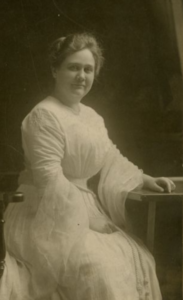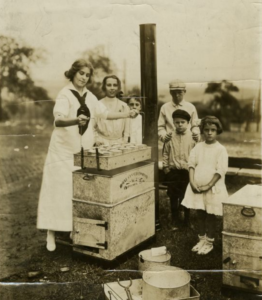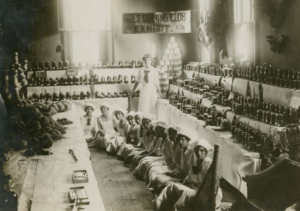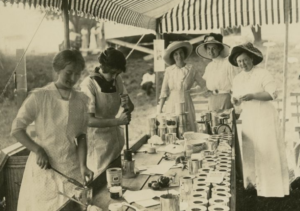

Tagged: Appalachia, Black history, economic history, Elisabeth Israels Perry, food, Progressive Era, South, women's history
By Adrien Lievin
September 28, 2021
This is part of a series of blog posts on women’s history and the long Progressive Era, honoring the legacy of the late Elisabeth Israels Perry. Perry served as SHGAPE President from 1998-2000 and had a long and distinguished career that highlighted women’s political activism in GAPE and in the “long Progressive Era” that stretched into the 1920s and 1930s. This blog series coincides with the July issue of the Journal of the Gilded Age and Progressive Era, which includes a roundtable (available to subscribers online) on Perry’s After the Vote: Feminist Politics in La Guardia’s New York (2019). Read the other posts in the series here and find the CFP here.
Virginia Moore, born in 1880 in Gallatin, Sumner County, Tennessee, was a key figure in the progressive movement. She brought the canning club revolution to her home state as one of the world’s first five home-canning demonstration agents. Home demonstration programs intended to improve the lives of rural women, organizing clubs throughout the countryside in order to teach them how to better accomplish daily tasks, such as sewing and gardening. Moore’s career highlights the complexity of the reform impulse that swept the country at the turn of the century, which blended class antagonism, dedication to scientific principles, and a gendered economic idealism. Through the little girls who attended demonstration clubs, Moore intended to use canning as a way to make Appalachian residents, especially women, both self-sufficient entrepreneurs and more efficient home cooks. Whereas many reformers frowned upon industrial capitalism and its devastating effect on local populations, Moore paradoxically taught her club members to embrace it and thrive off of it. What made the reformer particular was her advocacy of an economic feminism and her fight for Appalachian little girls’ economic citizenship in the capitalist New South, usually associated with elitism and manliness.

Portrait photograph of Virginia P. Moore as a young woman, 0012_003912_000063, Virginia P. Moore Collection, MS.3821. University of Tennessee Libraries, Knoxville, Special Collections.
Little is known about Moore prior to her demonstration career. Educated at George Peabody Normal College in Nashville, she started working in high schools and public educational institutions from 1908, organizing school improvement associations throughout her native Tennessee. Seaman A. Knapp, founder of the Farmers’ Cooperative Work Division of the Department of Agriculture and one of the most important agricultural reformers in the South, appointed her as the Tennessee state collaborator for the Farmers’ Cooperative Demonstration work in the South in November 1911. She became its business executive and managed its funds. By the spring of 1912, Moore had organized clubs in fourteen Tennessee counties; she also traveled out-of-state to help organize girls’ and women’s work and spread the canning revolution.
In addition to being active in her home state, Moore was involved with the federal government: she lobbied and negotiated for better funding with the House of Representatives’ Agricultural Committee in Washington D.C., and she became assistant director and state home demonstration agent in charge of women’s work for Tennessee in the Agricultural Extension Service before the country entered the First World War. She was Herbert Hoover’s representative in the US Food Conservation Work, and she also participated in the World War I Defense Council. Through such work, Moore embodied the activism and dedication to improvement preached by the progressive movement.
Under the banner of the Progressive reformers’ industrial education were various players who intended to teach immigrant and working-class children how to integrate into the changing capitalist economy of the early twentieth-century United States. In the South, education initiatives like Moore’s canning clubs belonged to this same realm of reform: they intended to teach children how to best use their environment to economically improve their lives. Instead of teaching classical academic subjects, such as history and literature, the progressive industrial education model promoted a vocational, practical, and technical education with scientific, industrial, and agricultural undertones, in order to integrate the former Confederacy into the New South’s industrial economy that championed capitalism. Reformers saw in industrial education and scientific principles the tools to bring about an economic revolution to rural people, a vision that Virginia Moore endorsed as well through her canning clubs.

Racheal Cook and her canning work, 1913, 0012_003912_000012, Virginia P. Moore Collection, MS.3821. University of Tennessee Libraries, Knoxville, Special Collections.
East Tennessee’s Appalachian mountains and its rugged topography prevented most of its inhabitants from planting cotton, which was the most lucrative crop throughout the South. Mountaineers, however, privileged a smaller-scale agriculture composed of fruits, vegetables, and corn, which they complemented with hunting, fishing, raising pigs and cattle, as well as picking wild fruits. In the late nineteenth century, capitalism was not yet entrenched in Appalachia. By 1880, the region had the greatest concentration of non-commercial family farms in the whole nation. Everybody worked in the kitchen garden for the family’s food supply. Women played an active part in the social and professional work of these communities, cornhusking and log rolling, slaughtering livestock, processing meat, managing poultry and orchard production, as well as bartering and selling home made products. Only a minority of mountaineers engaged in large-scale sales and trade outside of the community. The self-sufficient agriculture of this mountain region largely came to an end with the arrival of railroad, mining, and lumber corporations at the end of the nineteenth century, who established work camps and coal towns, drew mountaineers to work for them, extracted raw materials, and left once the area had been siphoned off.
It was the victims of these industrial operations that Virginia Moore wanted to uplift in Tennessee. When Moore embarked on a train from Knoxville headed south to mountainous Polk County to visit a canning club member, in 1911, a spectacle of desolation appeared before her eyes: “Fumes and gases had been utilized—it had killed the trees and all the vegetation. For miles and miles there were bleak, desolate mountains,” noted Moore. The coal mining industry had ravaged the area and she could see “red hot slags that resembled vivid red paint escaping the copper mines.”[1] Soil pollution prevented many from growing their food and living off their land. Most mountaineers employed by corporations had either little access to garden plots or little time to take care of them. To survive in this new environment, rural communities increasingly had to rely on country stores and outside merchants for their food supply, and thus lost their food self-sufficiency.
Moore’s canning clubs were meant to counter these communities’ dependency upon capitalism and outsiders. The reformer intended to help them take a new direction and become autonomous, food-wise, under this new industrial capitalist system. Moore operated in Southern rural areas among communities that turn-of-the-century America considered backward and uncivilized, yet at the same time deserving to be saved. While many club leaders were openly reluctant to cooperate with Black southerners, Virginia Moore even fostered racial cooperation with African Americans. She did bring her canning ideal to Black households in Tennessee and praised her fellow Black home demonstrators for their dedication to the canning ideals and to the uplift of their community. Through her canning clubs, Moore wanted to “emancipate” all Southern rural communities from the perils of economic modernization, making them healthier and instilling in her students middle-class scientific and managerial values.

Girls Canning Club Exhibit, 0012_003912_000047, Virginia P. Moore Collection, MS.3821. University of Tennessee Libraries, Knoxville, Special Collections.
Developed in France during the Napoleonic era, canning arrived in the United States in the 1810s but was unknown to most Appalachian families until Moore’s intervention. To become a member of a tomato canning club, a girl had to dedicate a one-tenth acre plot of her family’s land to tomatoes. Students took care of the entire process, from planting the seeds, to harvesting, and cooking the fruits that they would then preserve in jars or tin cans. Girls watched for insects, watered their fruits, sterilized and peeled the tomatoes, as well as sealed their containers. They also managed the marketing aspect of their work, designing eye-catching labels to display their skills at county fairs and agricultural events. The most talented contestants won money, scholarships, or railroad passes to attend far away institutions. Moore encountered significant success among Appalachian communities between 1911 and 1919.
The reformer wrote that a primary objective of canning clubs was “to provide some means by which the girls may earn money at home and at the same time get the education and viewpoint necessary for the ideal farm home,” education that advocated modern and efficient farming methods for better profits.[2] Moore taught these rural children how to buy their way to the top of the rural New South and how to master the southern capitalist networks of merchants, bankers, and farmers. Along with others among her fellow progressive educators, Moore saw in capitalism a double-edged phenomenon: both those communities’ demise, as well as their salvation. She saw in the southern kitchens the battlefields of the reform movement; she declared that youth clubs would permit “lessening the number of bankrupts by the kitchen route.”[3] She thought that “the tin can was truly the key which unlocked the door.”[4]
Girls were the primary recipients of Moore’s teachings, yet the reformer targeted their whole families as well, especially their health. According to her, canning would keep Appalachians fit all year long, which would increase their economic well-being and lessen their dependency upon industrial corporations’ shops. Moore regretted that mountaineers only ate healthy food during spring and summer. When colder times came, fruits and vegetables could not be grown, which compelled mountain families to eat fatty and non-nutritious food, such as lard, molasses, and biscuits. Doing so, Moore stated that they would not get vitamins, which would make them ill and stay at home for recovery. Not working implied not getting a full wage, which Moore considered detrimental to the family. The worst, for her, was when those families had no choice but to depend on coal towns and camps’ shops when kitchen gardens were empty. Canning, in addition to being particularly beneficial to girls and women, was in a broader sense better for the whole Appalachian family’s health, and thus economic independence. Food canned could be home-made and consumed all year long, even when gardens were empty.

Sealing Contest at the 1912 Tennessee State Fair, 0012_003912_000021, Virginia P. Moore Collection, MS.3821. University of Tennessee Libraries, Knoxville, Special Collections.
The economic citizenship of her club members was one of Moore’s ultimate goals. She taught those little girls how to become economically independent from their male counterparts. In a period during which many Americans—conservatives as well as some so called “progressives”—were not sympathetic to movements that claimed women’s enfranchisement, economic independence, and freedom from men’s supervision, Virginia Moore embraced an economic feminism through which little girls and mothers could improve their well-being and thrive in the Appalachian mountains’ capitalist regime: “a girl don’t have to marry if she can make money herself.”[5] She envisioned salvation through her canning clubs. Early twentieth-century gender expectations kept most women at home, out of the job market, to take care of their families. Mostly immigrants and unwed women worked for meager salaries, kept much lower than men’s. Widely shared social expectations encouraged such workers to quit when they married, to start a family. Moore wanted her girls not to limit their careers to that standard; she encouraged young women to go well beyond customary roles. If they became businesswomen, Moore’s club members would not have to hold onto a man to survive.
Canned food became an American staple and even a patriotic symbol during World War I. To Moore, the tin can was also a metaphorical weapon that had many facets; it permitted the Progressives’ conquest of East Tennessee while empowering her young club members’ to fight their way to the top of the New South’s capitalist economic networks. Moore herself was a career-oriented single and unwed woman whose dedication and hard work paid off. Not against marriage per se, she wanted to show her club members that with a strong will, everything was possible, even when coming from an economically damaged and socially stigmatized area. The tin can was a thriving and liberating force for many rural girls whose professional and economic opportunities had been significantly limited.
A native of the north of France, Adrien Lievin did his MA at UT Knoxville, where he fell in love with the Appalachians. He is currently a PhD candidate at the University of Lille (France), where he researches education, reform, gender and capitalism in Appalachian Kentucky at the dawn of the twentieth century.
Further Reading
Ellenberg, George B. “’May the Club Work Go on Forever’: Home Demonstration and Rural Progressivism in 1920s Ballard County.” The Register of the Kentucky Historical Society 2 (1998): 137-66.
Engelhardt, Elizabeth. “Canning Tomatoes, Growing ‘Better and More Perfect Women’: The Girls’ Tomato Club Movement.” Southern Cultures 4 (2009): 78-92.
Hoffschwelle, Mary S. Rebuilding the Rural Southern Community: Reformers, Schools, and Homes in Tennessee, 1900-1930. Knoxville: The University of Tennessee Press, 1998.
Lewis, Ronald L. Transforming the Appalachian Countryside: Railroads, Deforestation, and Social Change in West Virginia, 1880-1920. Chapel Hill: University of North Carolina Press, 1998,
Powers, Jane Bernard. The ‘Girl Question’ in Education: Vocational Education for Young Women in the Progressive Era. London, Washington D.C.: The Falmer Press, 1992.
Salstrom, Paul. “Appalachia’s Informal Economy and the Transition to Capitalism.” Journal of Appalachian Studies 2, no. 2 (1996): 213-33.
Shifflett, Crandall A. Coal Towns: Life, Work, and Culture in Company Towns of Southern Appalachia, 1880-1960. Knoxville: The University of Tennessee Press, 1991.
[1]Moore, untitled notepad, undated, pp.2-4, box 1, series 1, folder 2, Virginia Moore papers, Special Collections and Archives, University of Tennessee, Knoxville.
[2]Moore, “Objects of the Girls C. & P. Club Work,” undated, box 1, series 3, folder 11, Moore papers.
[3]Moore, “Gleanings from the Sayings of Dr. Seaman A. Knapp, the Agricultural Profit Who Founded Home Demonstration Work,” undated, p. 3, box 1, series 3, folder 20, Moore papers.
[4] Moore, “Reviewing Home Demonstration Work,” undated, p. 4, box 1, series 3, folder 12, Moore papers.
[5] Moore, “Tennessee’s Early Tomato Club and Home Demonstration Work from 1911-1919,” undated, pp.10-11, box 1, series 3, folder 11, Moore papers.
Cover Image: Montgomery County Girls Canning Club Display, Oct. 1915, 0012_003912_000048, Virginia P. Moore Collection, MS.3821. University of Tennessee Libraries, Knoxville, Special Collections.
Receive a year's subscription to our quarterly SHGAPE journal.